Usage of social media optimization has rolled out to support the latest wave in digital marketing strategies. The number of users on the different sites is in billions, and business organizations require advanced tools that would help them to present their presence in their view on the internet. All SMO Tools are packages of solution, which facilitates the process of content production, scheduling, analytics, and engagement on social media platforms.
Such platforms have changed the nature of the interaction between a brand and its audience, including the possibility of automation, AI-powered insights, and collaborative features. Small-scale start-ups to large corporations, among others, depend on these tools to ensure there is uniformity in the brand messaging, they use them to maximize the time of posts, and track the effectiveness of the campaigns. The appropriate SMO site would make a substantial difference to your social media ROI and the success level of your digital marketing.
What is SMO Tool?
SMO is either a set of strategies or tools with the aim of increasing visibility and traffic for the brand across social media platforms. SMO Tools can be defined as software packages that offer an end-to-end social media management system with features such as content planning, automated publishing, performance analytics, and tracking of audience engagement. Such contexts combine several social media and feature them on one dashboard to enable marketers to handle campaigns effectively.
Contemporary SMO platforms make use of artificial intelligence to auto-recommend the best times to post, provide content ideas, and competitor analysis. They help to produce a wide range of content in formats such as an image, video, story, or carousel, and keep the brand voice consistent across all channels.
Building an SMO tool has changed the traditional way of managing social media into a regularized and data-based mechanism of managing social media with emphasis on gaining the most out of its reach and engagement.
Why are SMO Tools Important
Social media management involves the use of advanced tools that have the capability to deal with the complexity of digital marketing campaigns. The role of employing holistic SMO platforms cannot be overemphasised in the contemporary competitive environment.
- Efficiency: SMO Tools save a gargantuan amount of time investment through automation of routine work, such as scheduling, cross-platform posting, so that teams can concentrate on strategy.
- Consistency: They will make sure there is a uniformity in brand messaging on all platforms, in keeping a professional presence through the centralized content management and automated posting schedule.
- Analytics: The advanced reporting options give deep insights into the audience, their behavior patterns, engagement rates, and campaign metrics that can be used to optimize through data-driven decision making.
- Scalability: Increased businesses: SMO tools are scalable, which means they support numerous accounts, the work of multiple people, and higher posting rates without scaling efforts of the same ratio.
- Cost-effectiveness: The one-stop shops eliminate the need to subscribe to different features, and hence the cost is saved as compared to using several features individually, while offering all of them in a single dashboard.
Limitations to Look for in All SMO Tools
Although SMO platforms have many benefits, it is important to consider their possible weaknesses so that the benefits of decisions made are informed. Becoming aware of these limitations proves to be the key factor in having realistic expectations and the ability to select the appropriate tools to fit certain requirements of the business.
- Complexity: The advanced features can overwhelm small and inexperienced teams; highly trained periods can be long, and productivity can be compromised until competency is reached.
- Cost-scaling: The additional features and user additions may impose heavy costs on monthly expenses, and it will be hard to plan budgets for growing organizations with an expanding workforce.
- Platform-dependency: Excessive use of individual tools poses a threat to the working process, being interrupted due to a failure in the service, a change in policy, or feature editing.
- Limited customization: Non-unique interfaces designed to meet similar brand needs or specific workflow preferences may not suit custom workflow options, as a desired limit to creativity in campaign execution.
- Integration-problems: There can be problems with compatibility with current marketing stacks or certain third-party applications, which will need more workaround or additional investments into tools.
Comparison Table for All SMO Tools
| Tool Name | Rating | Best Feature |
| Metricool | 4.5/5 | AI-powered content assistant |
| Buffer | 4.7/5 | Cross-platform scheduling |
| Canva | 4.8/5 | Built-in design templates |
| SocialBee | 4.4/5 | Content categorization system |
| ContentStudio | 4.3/5 | Bulk content scheduling |
| Later | 4.6/5 | Visual drag-drop calendar |
| Postly | 4.2/5 | AI-driven post-generation |
| Zoho Social | 4.5/5 | Real-time monitoring |
| Friends + Me | 4.1/5 | Browser extension integration |
| Publer | 4.3/5 | Instagram automation features |
List of Top 10 SMO Tools
1. Metricool
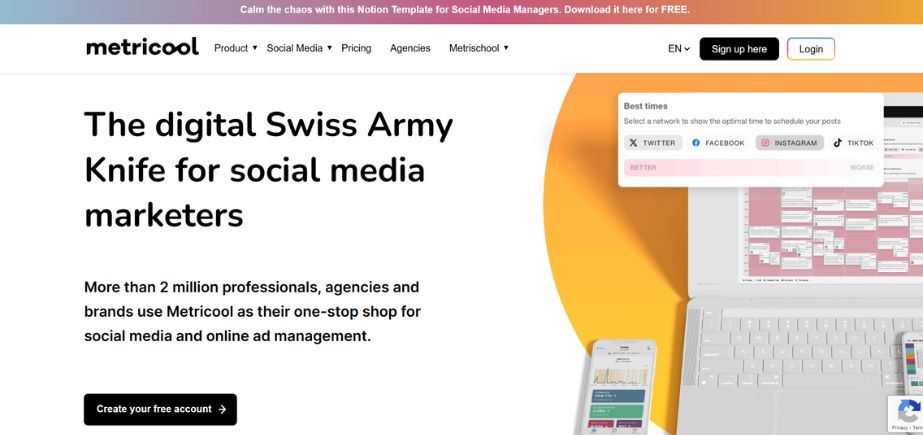
Rating: 4.5/5
Website: https://metricool.com
Best Use Cases: Multi-platform analytics and AI-powered content optimization for agencies
Metricool is a complete social media marketing tool that has 2 million satisfied agencies and trustworthy brands across the world. The tool has excellent data capabilities on analytical power and intelligent content planning, which makes it the best option when a business is in need of an analytically determined social media approach. The platform has the smartest reporting functions, and it is intuitive in affording multi-platform scheduling.
The AI-based assistant offered by Metricool allows one to optimize the performance of the existing content, as well as captioning, hashtags, and potential posting times. It has an excellent user-friendly interface that caters to every user, including a novice and a well-informed marketer, offering scalable solutions to the emerging firms. The good thing about the platform is that it allows the users to arrange a complex information into simple measurements which can be used in the strategic decisions making.
Key Features:
- Multi-platform scheduling integration
- AI content optimization
- Advanced analytics dashboard
- Smart posting suggestions
- Competitor analysis tools
Pros:
- Comprehensive reporting system
- Intuitive user interface
- Excellent customer support
Cons:
- Higher pricing tiers
- Learning curve exists
- Limited design features
Pricing: From $18/month
2. Buffer
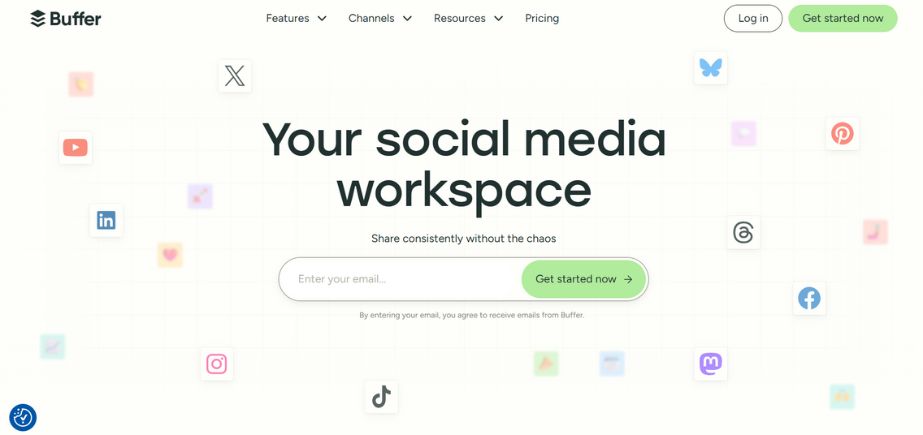
Rating: 4.7/5
Website: https://buffer.com
Best Use Cases: Streamlined scheduling and analytics for small businesses and solo marketers
Buffer has been ranked as one of the social media management tools, popular because of its simplicity and its performance. The tool is highly user-focused as its interfaces are clean and all features are easily handled by marketers of any skill level. The main advantage of Buffer is its availed intelligent scheduling services, which provide time optimization with the help of AI to ensure the best overall performance.
Its platform is integrated with the major social networks, and it has a proper analytical tool that can unveil more information about the audience. It has a feature of recommendation content and Google Analytics and this comes in handy when optimizing a campaign. Buffer will help businesses that are concerned with the need to manage social media and provide basic features that are consistently of high quality, instead of confusing users with advanced features.
Key Features:
- Cross-platform scheduling capabilities
- AI-driven timing optimization
- Google Analytics integration
- Content recommendation engine
- Sentiment analysis tools
Pros:
- User-friendly interface design
- Reliable scheduling system
- Excellent mobile app
Cons:
- Limited advanced features
- Fewer integrations available
- Basic design capabilities
Pricing: $5/month
3. Canva
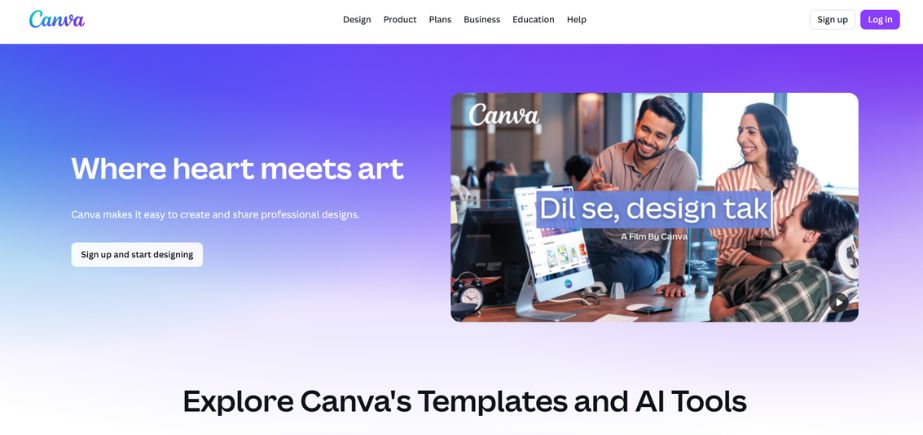
Rating: 4.8/5
Website: https://www.canva.com
Best Use Cases: Visual content creation with integrated social media management capabilities
Canva has surpassed the conventional design tool by having extensive capabilities for managing social media, together with the recognized abilities of graphic design. This platform is based on both creativity and effective social media planning, as users get the pre-sized templates according to what social networks they need them to fit, as well. Its easy-to-use drag and drop editor, Canva, enables average people without design skills to design professional quality, fabulous content, and the clever scheduling capabilities help users at the best time and time zone.
Their wide selection of templates supports and is compatible with all forms of social media postings, Instagram stories, and LinkedIn posts to ensure uniformity and continuity with the brand. Advanced features available to Pro subscribers are storage of brand kits, choice of individual fonts, and Share workspaces. The distinctive nature of Canva as a design tool and social media manager allows it to be extremely valuable to content-intensive marketing plans.
Key Features:
- Platform-specific template library
- Drag-and-drop editor interface
- Brand kit storage
- Collaborative design features
- Smart content scheduling
Pros:
- Extensive template collection
- Intuitive design interface
- Strong brand consistency
Cons:
- Limited analytics features
- Premium pricing required
- Design-focused limitations
Pricing: $ 45.75/year
4. SocialBee
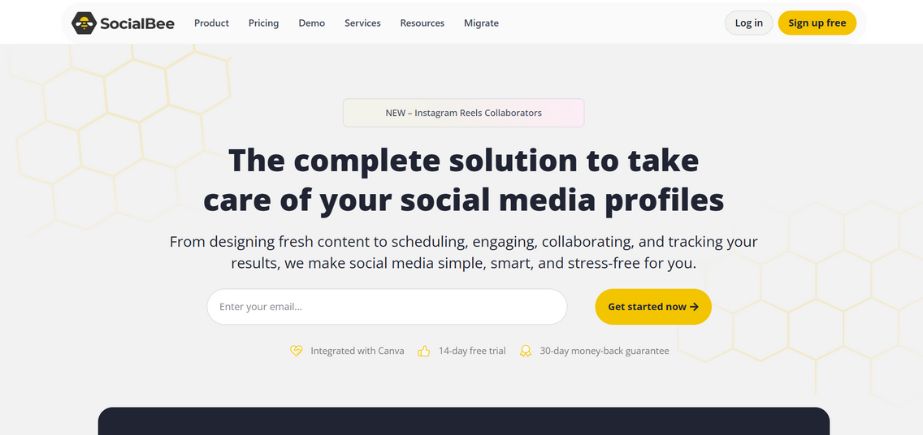
Rating: 4.4/5
Website: https://socialbee.com
Best Use Cases: Content categorization and recycling for systematic social media management
SocialBee changes the way that social media is handled by introducing novel content organizing algorithms and AI-assisted functionalities. The platform helps to categorize the content in sound sections, including promotional content, educational, and evergreen posts, so as to have a balanced presence on social media. The AI Copilot created by SocialBee provides more than 1000 ready-made templates to help users produce content that will be interesting to read.
The recycling feature of the platform allows maximizing the performance of the evergreen content, and advanced analytics allow tracking engagement level, reach, and growth rates. SocialBee is designed to suit business organisations in need of systematic ways of handling social media with provisions that facilitate long-term content strategies. Use of collaborative features and assignment of roles helps make it suitable for teams that need well-organized workflows and content approval procedures.
Key Features:
- Content categorization system
- AI Copilot functionality
- Content recycling capabilities
- Advanced engagement analytics
- Team collaboration tools
Pros:
- Systematic content organization
- Powerful AI features
- Comprehensive analytics dashboard
Cons:
- Steeper learning curve
- Higher pricing structure
- Complex feature set
Pricing: $29/month
5. ContentStudio
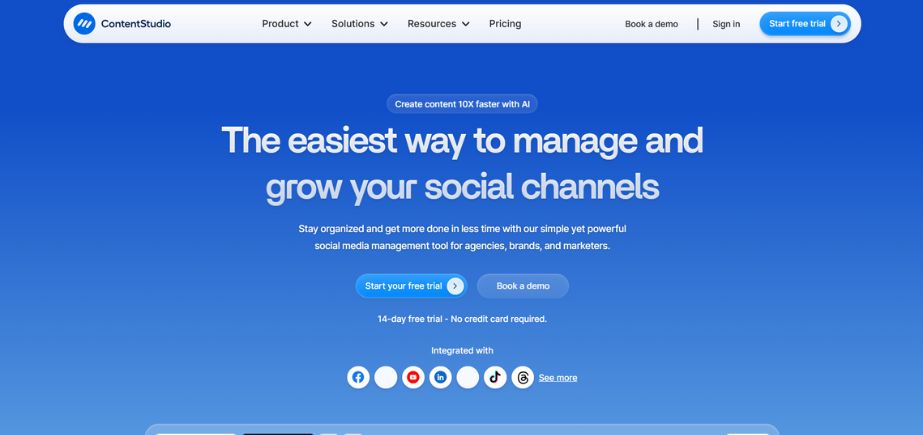
Rating: 4.3/5
Website: https://contentstudio.io
Best Use Cases: Bulk content management and AI-driven content generation for agencies
ContentStudio is a comprehensive content promotional product that offers simple social media management features and functions. This is perhaps the best tool to be used when bulk content work is performed, as it is possible to execute a CSV import and to administer evergreen campaigns, which will not waste too much time in content-intensive organizations. The AI capabilities of ContentStudio also include generating hashtags, creating content, and writing short copy, but using the content discovery engine can also open the doors to using different platforms like Pixabay, Flickr, and Giphy as sources of media of all kinds.
The advantage of the platform is the possibility to manage content on a large scale and maintain consistency and quality. It has collaborative functions that aid team working flows, approval systems, and access control. ContentStudio is attractive to its agencies and enterprises that need powerful content management tools with effective social media planning.
Key Features:
- Bulk content scheduling
- AI content generation
- Integrated media discovery
- CSV import functionality
- Evergreen campaign management
Pros:
- Excellent bulk operations
- Comprehensive content tools
- Strong integration capabilities
Cons:
- Complex interface design
- Higher learning requirements
- Premium feature costs
Pricing: Standard: $19/month
6. Later
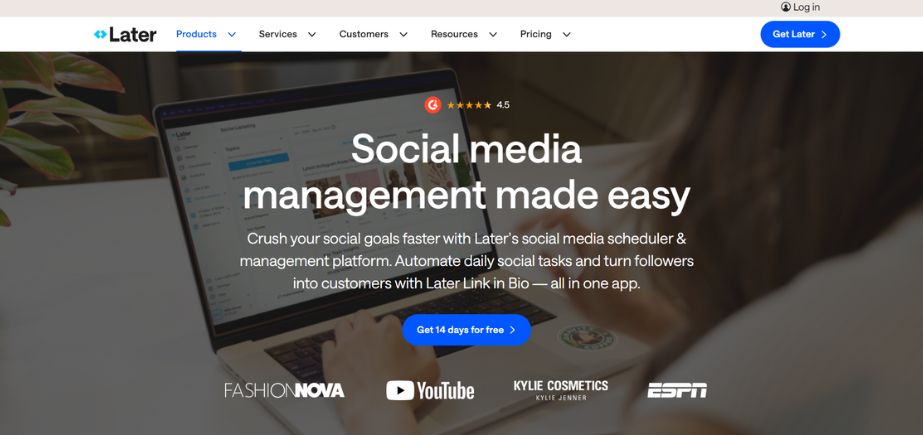
Rating: 4.6/5
Website: https://later.com
Best Use Cases: Visual content planning and Instagram-focused social media management
Later, previously Planoly, focuses on visual-first social media planning and especially on Instagram marketing. Scheduling on this platform is simple since the thedrag-and-dropp calendar is very intuitive, and offers previews on how posts may look on the different social networks. Advanced ability to tag and take notes is among the functionalities within the unlimited media storage of Later, apart from efficient organization of libraries.
The platform is excellent at performing hashtag research and suggestions, as it provides a preview of grid layouts and setup of feed content that will maintain an aesthetic. The visual focus of managing social media by Later is of interest to the brands that focus on visual story and Instagram marketing. It has a user-friendly interface and robust mobile app, which makes it approachable by users of all levels of experience, simultaneously offering advanced planning features.
Key Features:
- Visual drag-drop calendar
- Unlimited media storage
- Hashtag recommendation system
- Grid layout previews
- Feed planning tools
Pros:
- Intuitive visual interface
- Strong Instagram features
- Unlimited media storage
Cons:
- Limited analytics depth
- Platform-specific focus limitations
- Higher tier pricing
Pricing: $16.67/month
7. Postly
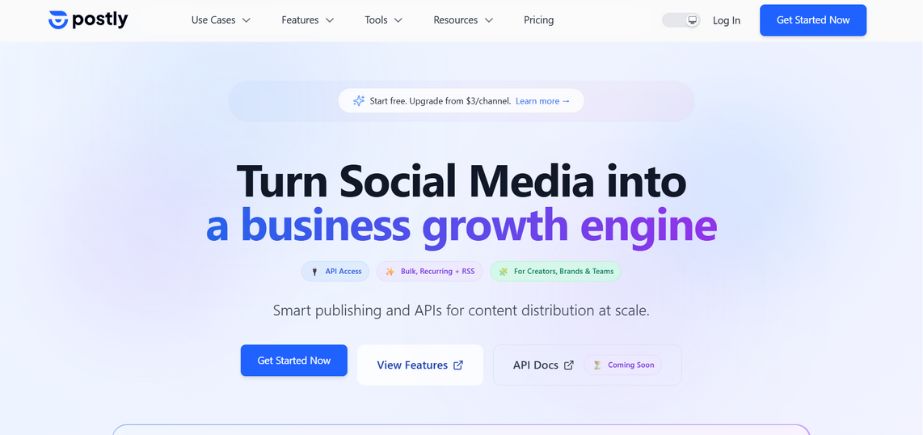
Rating: 4.2/5
Website: https://postly.ai
Best Use Cases: AI-driven content generation and automation for small brands and creators
Postly is the new era of social media management that combines AI and intelligent content creation as well as post automation. This platform uses artificial intelligence to create various ideas of posts that are exclusively fit to the platform, hashtags, and captions differentiated to be embraced by the target audience. Among the large social networks supported by Postly, you will find such names as Reddit, Pinterest, Discord, Facebook, Instagram, and YouTube, which cover a wide range of approaches to marketing.
The platform has bulk upload and intelligent scheduling to present uniform posts across different channels, and the intelligent method of AI use reduces the time spent on creating the content. Postly has the potential of being appealing to small brands, creators, as well as agencies that require automation without involving a large number of individuals to execute it, but still attribute to the quality of its content. It has collaborative options that allow organization of content production and the approval processes through teamwork.
Key Features:
- AI-powered content generation
- Multi-platform support system
- Smart bulk scheduling
- Automated hashtag creation
- Collaborative workflow tools
Pros:
- Advanced AI capabilities
- Comprehensive platform support
- Efficient automation features
Cons:
- Newer platform limitations
- AI dependency concerns
- Limited customization options
Pricing: $9-15/month
8. Zoho Social
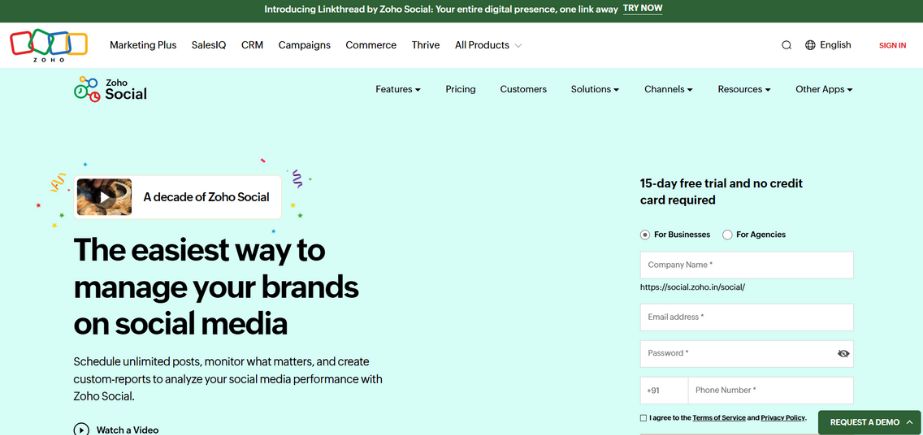
Rating: 4.5/5
Website: https://www.zoho.com
Best Use Cases: Enterprise social listening and comprehensive brand monitoring solutions
Compared to the ever-competitive world of SMO, Zoho Social offers brand reputation and management capabilities, and thus fits perfectly in businesses when tracking such a subject is important. Real-time social listening is the domain where this platform demonstrates great results, allowing it to monitor keywords, comments, and mentions of brands on various platforms that can be tracked at the same time. The in-depth analytics of Zoho Social introduce such features as the source of clicks, engagement rates, view counts, and reach statistics, which are important insights to make a strategic decision.
The collaborative functions of the platform are internal comments, role-based access, and approval drafts of document workflows that facilitate complicated structures in organizations. Its connection to the wider Zoho ecosystem is also of value to the business, which has already implemented the Zoho business applications. Zoho Social is a product that attracts those enterprises that need highly sophisticated monitoring features along with a comprehensive social media management functionality.
Key Features:
- Real-time social monitoring
- Advanced analytics dashboard
- Collaborative workflow system
- Multi-platform publishing capabilities
- Zoho ecosystem integration
Pros:
- Comprehensive monitoring features
- Detailed analytics reporting
- Strong collaboration tools
Cons:
- Complex interface design
- Higher pricing structure
- Steep learning curve
Pricing: $15/month
9. Friends + Me
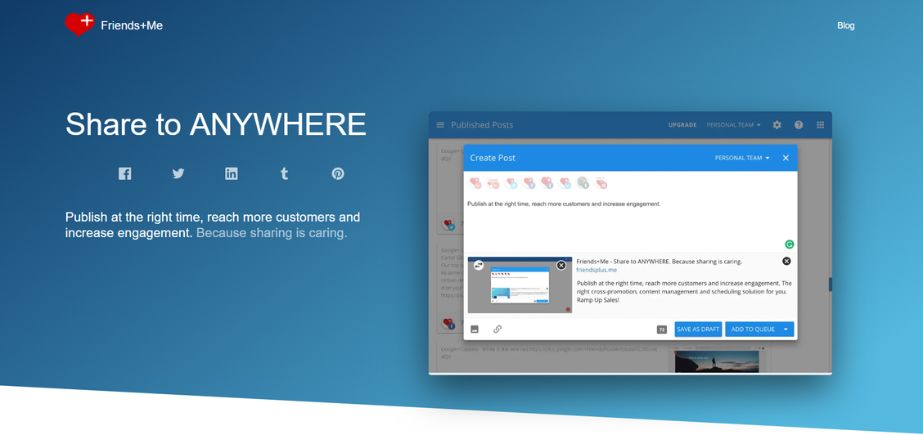
Rating: 4.1/5
Website: https://friendsplus.me
Best Use Cases: Cross-platform automation and content curation for entrepreneurs and small teams
Friends + Me stands out by having strong automation and more interactive content curation functionalities that impress and suit busy individuals like entrepreneurs and content creators. The platform performs better in cross-platform scheduling, which can allow automation posting so that one can be well represented in a variety of social sites. The option of posting in bulk enables users to post content on various platforms at once, to utilize time to the fullest potential of the time-deprived marketer.
The integration of Friends + Me browser extension lets users save and collect content during web browsing sessions, which makes the content discovery process much easier. The site provides options of different kinds and forms of content and flexibility in scheduling across the different time zones. Its automation-based strategy is MD-friendly since it gives its clients the flexibility to keep their commercial activity on social media without much manual work, guaranteeing the content quality and activity.
Key Features:
- Cross-platform automation capabilities
- Bulk content upload
- Browser extension integration
- Content curation tools
- Multi-timezone scheduling
Pros:
- Strong automation features
- Efficient content curation
- Browser integration benefits
Cons:
- Limited analytics capabilities
- Fewer advanced features
- Interface modernization needs
Pricing: $9/month
10. Publer
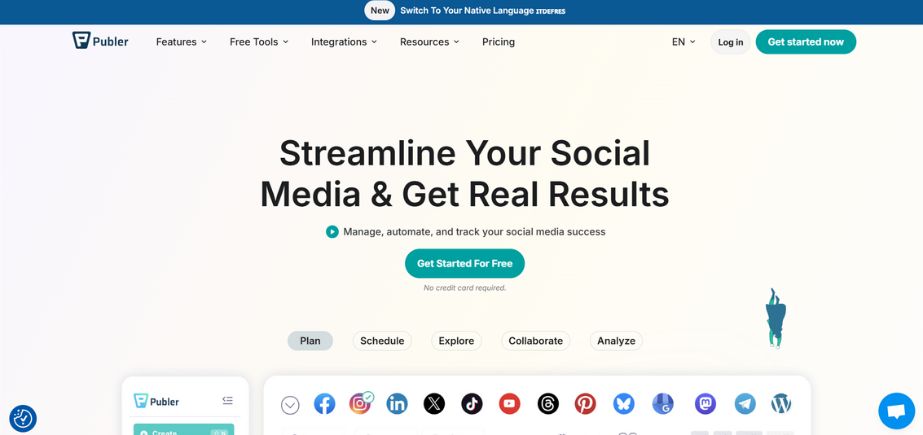
Rating: 4.3/5
Website: https://publer.com
Best Use Cases: Instagram and Facebook group automation for content creators and marketers
Publer is also specialized in fine-tuning automation options, especially on Instagram and Facebook groups, specializing therefore, in content creators and marketers that are interested in these platforms. This tool creates instant prompts, hashtags, and captions, and facilitates the complex posting automation that does not create engagement inconsistencies. The asset management system offered by Publer is folder- and tag-based, and it allows numerous integrations to help in workflow automation.
The platform is strong in automating Instagram and Facebook groups, which is something that most SMO tools lack. It is highly automated and easy to use so that even inexperienced users could have such a kind of automated server at their disposal, but at the same time has advanced scheduling and content management features. Publer is addressed to marketers who need custom automation towards specific platforms and complete features of content organization.
Key Features:
- Instagram automation capabilities
- Facebook group posting
- Instant content generation
- Asset management system
- Multiple platform integrations
Pros:
- Specialized automation features
- User-friendly interface design
- Efficient content organization
Cons:
- Platform-specific limitations
- Fewer analytics features
- Limited enterprise capabilities
Pricing: $12-15/month
How to Choose the All SMO Tools
Making a choice of an SMO platform must consider your needs and budget needs and overall marketing goals. The choice, as well as the overall social media strategy and efficiency of that, is substantially influenced.
- Budget: Evaluate the total cost of user licenses, premium features and potential cost of scaling to make a sustainable long-standing investment that fits the marketing budget allocation, estimates and ROI.
- Features: Selecting the key features: concentration on scheduling, analytics, collaboration tools, and consider the future functionality that can be needed: AI assistance, automation skills, and integrations that will be required to cover the whole process of work.
- Scalability: Choose platforms with scalable user limits, post limits and other platform features that do not require full migration of systems of a business over to the new platform and scale up workflows and processes without disrupting them too drastically in times of business expansion.
- Integration: Assess how this integrates with the existing marketing technology stack, through CRM systems, email, and analytics tools, in a way that data can move freely and enable operational excellence measuring all marketing mediums.
- Support: Aspects to assess include customer service quality, documentation, training resources, and community support to ensure success during the implementation and subsequent optimization of the platform with respect to the best return on investment.
Conclusion
All SMO Tools are an ever-changing landscape as the use of technology and social media algorithms changes. The choice of the appropriate platform should be made by the peculiarities of business needs, financial conditions, and strategies. The use of modern SMO tools allows getting the complete set of solutions that streamline the process of controlling social media and that can help to properly optimize the results. These platforms have simplified social media marketing with AI-driven content creation tools along with the power to analyse and automate tasks to a whole new level.
The return comes in terms of organizational efficiency, on-message brand communication, and quantifiable increases in performance with the investment in quality that All SMO Tools provides. With social media still reigning heavily in digital marketing plans, it is inevitable to have an upper hand in the highly competitive market through the use of a sophisticated SMO platform today as a key player in the changing market.
FAQs
Q1: All the SMO Tools, and what benefits do they bring to businesses?
Any SMO Tool is a complete social media optimization software capable of streamlining the production, scheduling, analysis, and interaction across various social media and considerably enhancing the efficiency of marketing and the ROI.
Q2: Which SMO Tools have the most appropriate value to small businesses?
Buffer and Later would be a great value offering to these small businesses because both have simple user interfaces, key features, and low-budget pricing schedules that fit small pocket budgets but offer complete functionality.
Q3: Are all SMO Tools able to fit into current marketing technology stacks?
The current state of most contemporary All SMO Tools is the possibility of extensive integration of its functionalities with CRM systems, email-sending platforms, and tracking software, which guarantees proper workflow integration as well as the synchronization of data in various marketing channels.
Q4: What are the improvements to content performance with AI-powered All SMO Tools?
All SMO Tools using AI examine audience activity, recommend when to post, help create relevant hashtags and captions, and provide suggestions on content to create that will improve a campaign’s engagement rates and overall success.
Q5: What should be considered by businesses in the choice of all SMO Tools to collaborate with their team?
Take into account such features as a role-based permission system, approval workflow, internal comments, asset sharing, and user management possibilities that allow collaborating with its peers with an emphasis on the quality of content and the preservation of brand integrity.
